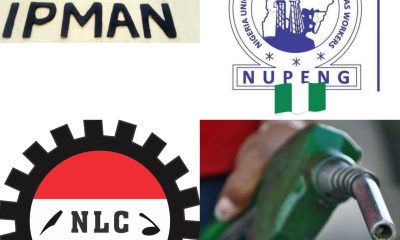Petrol Price Update
Oil Marketers to Dangote: Inclusion Key to Refinery’s Success

The hope of Nigeria achieving energy independence through the Dangote Refinery has faced another test as oil marketers raised concerns about exclusion in its distribution framework
Also Read: Dangote Slams NUPENG Over ₦50,000 Hidden Levies Per Truck, Says Charges Worsen Fuel Prices
The Independent Petroleum Marketers Association of Nigeria (IPMAN) and other key stakeholders have called on the management of the 650,000 barrels-per-day facility to ensure inclusiveness in operations, warning that sidelining smaller marketers could hurt the refinery’s long-term success.
Commissioned with global attention, the Dangote Refinery is Africa’s largest single-train refinery and is expected to transform Nigeria from a heavy importer of refined petroleum products into a net exporter. With capacity to meet both local and regional demand, its success is seen as a major step in addressing perennial fuel scarcity, forex drain, and subsidy complications.
Yet, just months into its operations, distribution concerns are surfacing. Oil marketers argue that the supply chain must not be monopolized by a few large players, as this would replicate the same problems the refinery was established to solve.
What the Marketers Are Saying
According to IPMAN officials, the demand is not confrontational but a matter of fairness. They insist that for the refinery to achieve its mission of stabilizing Nigeria’s downstream sector, all licensed marketers from major operators to smaller independent dealers must have access to products.
“We are not against Dangote Refinery. On the contrary, we want it to succeed. But for that to happen, inclusion is key. If only a select group of marketers are given access to products, it will create artificial scarcity and leave ordinary Nigerians at the receiving end,” one industry stakeholder explained.
The Nigerian downstream sector is complex, with thousands of retail outlets spread across urban and rural areas. Independent marketers own the majority of filling stations in the country, especially in underserved communities. If these players are excluded, fuel distribution will remain bottlenecked, and the very goal of stabilizing supply could fail.
Furthermore:
- Competition keeps prices fair: More players in the supply chain prevent hoarding and profiteering.
- Wider reach: IPMAN stations serve areas majors often neglect.
- Public trust: Nigerians will judge the refinery’s success not by production numbers but by fuel availability and pump prices.
While the refinery has not directly responded to every marketer’s claim, its management has emphasized phased operations and structured distribution. Sources close to the refinery suggest that technical, regulatory, and logistical considerations shape its early supply framework.
Industry watchers say this is expected, but warn that prolonged exclusion of independent marketers could trigger protests, litigation, or even disruptions in the distribution chain.
Nigeria’s downstream oil sector has a history riddled with strikes, scarcity, and rent-seeking. The Dangote Refinery was hailed as a game-changer to reset this narrative. But experts say that can only happen if all stakeholders are carried along:
- Government regulators must ensure fairness and transparency.
- Dangote management must balance efficiency with inclusivity.
- Marketers must act responsibly, focusing on distribution and not exploitation.
If negotiations between oil marketers and the Dangote Refinery management do not yield inclusivity, Nigeria risks a repeat of the same problems that plagued NNPC monopoly days. On the other hand, a transparent, inclusive distribution framework could ensure:
- Affordable fuel prices at pumps
- Reduced smuggling and black-market operations
- Job creation in retail distribution
- A truly national refinery that benefits every Nigerian
Conclusion
The Dangote Refinery is a historic project with the potential to reshape Nigeria’s energy landscape. But success depends on more than production capacity; it requires a fair, inclusive, and transparent distribution system. As marketers put it, “We are not against the refinery. We want it to succeed. But success must be shared.”
Petrol Price Update
Dangote Slams NUPENG Over ₦50,000 Hidden Levies Per Truck, Says Charges Worsen Fuel Prices

Nigeria’s fuel supply chain is once again under the spotlight, as Aliko Dangote, Africa’s richest man and owner of the Dangote Refinery, raises alarm over hidden levies allegedly imposed by members of the Nigeria Union of Petroleum and Natural Gas Workers (NUPENG).
Also Read: Dangote Refinery Deploys 4,000 CNG-Powered Trucks for Fuel Distribution
According to Dangote, truck owners are being forced to pay ₦50,000 per truck in unofficial charges, a cost he describes as “unsustainable” and one that ultimately inflates the price of fuel for ordinary Nigerians.
This revelation comes at a time when Nigerians are grappling with rising fuel costs, subsidy debates, and economic hardship, sparking urgent questions about the integrity of the petroleum transport chain.
Dangote’s Claim: A System Rigged with Hidden Costs
Speaking during a high-level industry dialogue, Dangote emphasized that these unofficial levies are crippling distribution networks and making the refinery’s efforts to stabilize fuel prices almost impossible.
“Every truck that leaves with products is forced to pay ₦50,000 in hidden levies. How can this be sustained? These costs are not borne by transporters—they are passed directly to consumers. This is why pump prices remain unstable,” Dangote lamented.
His words echo broader frustrations within the downstream oil sector, where middlemen, unions, and cartels are often accused of manipulating systems for profit.
NUPENG’s Role and the Allegations of ‘Extortion’
The Nigeria Union of Petroleum and Natural Gas Workers (NUPENG) is a powerful body, often at the center of labor negotiations, strikes, and nationwide fuel distribution. While the union officially denies sanctioning extortion, industry insiders claim certain factions within the transport chain enforce “mandatory payments” before trucks can load or move products.
For truck operators, the ₦50,000 charge is non-negotiable, effectively becoming a shadow tax on every tanker carrying fuel across the country.
The Ripple Effect: Nigerians Bear the Brunt
The impact of these hidden charges goes beyond the trucking companies — it lands directly on the pockets of ordinary Nigerians.
- Higher Pump Prices – Costs added to logistics eventually inflate fuel prices at filling stations.
- Supply Disruptions – Truckers unable to pay are sometimes delayed or blocked, worsening scarcity.
- Economic Strain – Transport costs affect not only fuel but also goods and services across sectors.
For a nation where fuel drives virtually every aspect of the economy, such hidden levies amount to a national economic sabotage.
Industry Reactions
Transport unions, depot owners, and regulatory bodies have all weighed in:
- Independent marketers argue that the ₦50,000 levy makes it nearly impossible to operate profitably.
- Regulatory agencies maintain they are unaware of such practices but have pledged to investigate.
- Civil society groups accuse both government and unions of deliberately turning a blind eye to extortion.
The Larger Picture: Transparency in the Oil and Gas Supply Chain
Dangote’s allegations highlight deeper systemic failures in Nigeria’s petroleum industry. For decades, the supply chain has been plagued by:
- Unregulated charges
- Poor monitoring of unions and transport operators
- Corruption at depots and loading points
Until these leakages are addressed, Nigerians will continue paying more than necessary for petroleum products, regardless of refinery efficiency or subsidy policies.
The Way Forward
Experts suggest several urgent measures:
- Independent monitoring of truck movements and depot operations
- Strict penalties for extortion or illegal levies
- Transparent union accountability
- Digital payment systems to reduce cash-based transactions
If implemented, these measures could help dismantle entrenched systems of corruption and bring genuine relief to Nigerians at the pump.
Conclusion
The fight for affordable fuel in Nigeria is not only about subsidies or refining capacity, it is also about cleaning up the opaque transport chain that delivers fuel to the people. Dangote’s revelations may be uncomfortable for industry players, but they shine a necessary light on practices that silently rob Nigerians daily.
Until the ₦50,000-per-truck “hidden tax” is addressed, the dream of affordable and stable fuel pricing may remain out of reach.
Petrol Price Update
Dangote Slams Depot Owners, Marketers Over N1.5 Trillion Fuel Subsidy Demand

Nigeria’s downstream oil sector has been thrown into fresh controversy as Dangote Petroleum Refinery & Petrochemicals locked horns with the Depot and Petroleum Products Marketers Association of Nigeria (DAPPMAN) over a staggering ₦1.505 trillion subsidy demand.
Also Read: Dangote Refinery Deploys 4,000 CNG-Powered Trucks for Fuel Distribution
The disagreement highlights one of the biggest challenges facing Nigeria’s fuel supply chain logistics, distribution costs, and the ever-sensitive issue of subsidies.
The Heart of the Dispute
At the center of the battle is DAPPMAN’s request for Dangote to absorb the difference in cost between lifting products directly from the refinery gantry in Lagos and lifting through coastal logistics routes.
- Depot owners argue that multiple charges including coastal freight, Nigerian Ports Authority (NPA) fees, Nigerian Maritime Administration and Safety Agency (NIMASA) levies, and vessel pumping charges increase the landed cost of fuel by ₦75 per litre.
- With Nigeria consuming about 40 million litres of petrol (PMS) daily and 15 million litres of diesel (AGO) daily, Dangote calculated the extra burden at ₦1.505 trillion annually.
In essence, depot operators want Dangote to foot the bill, a request the refinery has branded as unsustainable and dangerous for the market.
Dangote Fires Back
Aliko Dangote’s refinery has rejected the subsidy request outright, accusing some marketers of trying to replicate the old subsidy culture that drained Nigeria’s economy for decades.
According to the company:
- No Gantry Price Increase: Dangote insists it will not adjust its gantry pricing to cover what it describes as artificial costs.
- Market Manipulation Allegations: The refinery accused certain marketers of smuggling and round-tripping, claiming some depots divert products or export them illegally while demanding protection at home.
- Capacity Assurance: Dangote claims it has enough capacity to meet domestic demand while still exporting, boasting of a 500 million litre monthly stock buffer.
In a stinging rebuke, the refinery said granting DAPPMAN’s request would be tantamount to re-introducing subsidies through the backdoor.
Marketers Strike Back
DAPPMAN has denied all allegations of smuggling and diversion, warning Dangote to either produce evidence or retract its claims.
- The association has issued a seven-day ultimatum threatening legal action if the refinery fails to substantiate its accusations.
- Marketers argue that they are being unfairly portrayed as saboteurs, and insist that the real problem lies in transparency of dispatch and loading records.
- They maintain that Dangote’s claims about daily consumption figures and supply capacity should be independently verified.
One marketer described the allegations as “an attempt to tarnish reputations and avoid addressing structural logistics issues.”
Why This Matters
Nigeria’s fuel sector has long been entangled in the politics of subsidies and deregulation. The removal of federal subsidies in 2023 left pricing to market forces, but the Dangote vs DAPPMAN clash shows how logistics costs still threaten to tilt the market.
- If Dangote holds its ground, depot owners may be forced to raise pump prices, especially outside Lagos.
- If depot owners prevail, Dangote could be pressured into a hidden subsidy, echoing the same practices that once cost Nigeria billions annually.
- Government regulators may eventually need to step in to prevent fuel scarcity or price hikes.
What to Watch
- Legal Showdown: Will DAPPMAN follow through with its lawsuit?
- Government Mediation: The Nigerian government may intervene given the political sensitivity of fuel prices.
- Consumer Impact: If depot owners pass on costs, Nigerians could see pump prices spike, particularly in the North and remote areas.
- Market Direction: This dispute may ultimately shape the future of deregulation in Nigeria’s downstream petroleum sector.
RoadKing.ng Analysis
This fight is bigger than Dangote and the marketers, it is about who controls Nigeria’s new fuel economy.
- Dangote wants to establish itself as the sole price anchor, refusing to be burdened with subsidies.
- Marketers want logistics fairness, ensuring depot operators far from Lagos aren’t disadvantaged.
- Consumers are caught in the middle, waiting to see whether deregulation truly means lower prices or yet another cycle of subsidy games.
Nigeria has been here before. The difference now is that Dangote Refinery is the single largest player in Africa’s downstream oil market. Its decisions will shape the pump price for over 200 million Nigerians.
News Update
NUPENG Calls Off Strike After DSS-Brokered Resolution with Dangote

Fuel Crisis Watch (RoadKing.ng)
Update Overview
The Nigeria Union of Petroleum and Natural Gas Workers (NUPENG) has officially suspended its nationwide strike, following a decisive agreement with Dangote Refinery facilitated by the Department of State Services (DSS) and high-level government intervention.
Also Read: Fuel Crisis: Filling Stations in Calabar Shut Down
NUPENG’s National President, Williams Akporeha, confirmed that Dangote agreed to allow unionisation of its drivers, one of the union’s central demands.
A Memorandum of Understanding (MoU) was signed, affirming that unionisation is a fundamental right, that the process should begin immediately, and that no worker should face retaliation for joining. The goal is to complete the process between September 9–22, 2025.
Implications & Impact
| Focus Area | Highlights |
|---|---|
| Fuel Supply | The suspension of the strike is expected to avert any looming fuel shortages and restore normal distribution across the country. |
| Industry Relations | The resolution enhances labour relations within the petroleum sector and signals positive steps toward upholding workers’ rights. |
| Next Steps | Stakeholders will monitor the MoU’s implementation closely, with government-led oversight to ensure compliance and prevent future disputes. |

 Crash News1 day ago
Crash News1 day agoTwo Killed in Fiery I-35 Pileup in Cotulla, Texas

 News Update2 days ago
News Update2 days agoChaos in New York: Trump’s Motorcade Blocks Macron Amid UN Tensions

 Driving School Review2 days ago
Driving School Review2 days agoProtecting Your Driving School Name: Essential Guidance

 Articles1 day ago
Articles1 day agoInside Nigeria’s Most Dangerous Highways: The Roads That Claim the Most Lives

 Crash News1 day ago
Crash News1 day agoCar Explosion at Rivers State University: Students Panic as Vehicle Blows Up Near Main Gate

 Automotive Spotlight & Review8 hours ago
Automotive Spotlight & Review8 hours agoThe New Mercedes-Maybach V12 Edition: Only 50 Units of Ultra-Exclusive Luxury

 News Update1 day ago
News Update1 day agoBangkok Hospital Sinkhole Disaster: No Casualties, But Urban Fragility Exposed

 Crash News1 day ago
Crash News1 day agoContainer Crushes Police Officer, Passenger to Death on Ijora Causeway, Lagos



























